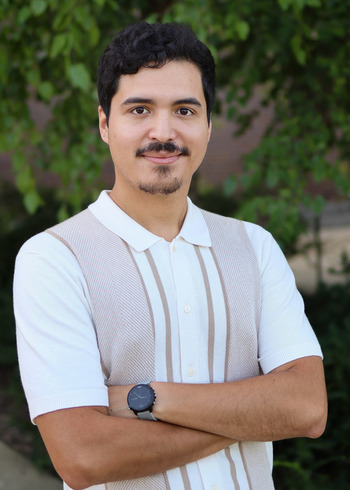Sergio Hernandez-Ortiz
Sergio Hernandez-Ortiz is a doctoral student in Sean Crosson's lab. Here are his answers to the Micro Biography questions:

How and when did you become interested in the field(s) of microbiology, genetics, and/or immunology?
I developed an interest in microbiology during a botany class in my undergraduate studies. We were looking at a pond sample through a microscope and I saw a mobile microbe darting around looking for food.
Were there any particular people or events who were influential in your journey?
There are two individuals that helped me on this journey. Firstly, my mother, Angelina Ortiz- Alvarado. She always talked about her microbe classes in her undergraduate studies and how fascinating they were. Secondly, Robert Ross, my botany professor from my undergraduate studies, who always suggested I continue to do research as a career.
How did you come to be a part of this department?
After finishing my bachelor's degree, I was accepted into a post-baccalaureate program at Michigan State University to acquire more research experience in Microbiology. I was fortunately able to work in Shannon Manning’s laboratory and take part in activities of the MGI department.
What is your main research area right now and why is it important?
My main research focuses on how a common chemical, Ethylenediaminetetraacetic acid (EDTA), affects a freshwater bacterium, Caulobacter crescentus, and how this bacterium acclimates to this chemical with its iron uptake systems. My research allows us to understand the impact of EDTA on freshwater bacteria as this chemical continues to accumulate in our lakes. We strive to generate a model to explain how lakes with different mineral compositions may support ameliorate the effects of EDTA on bacteria.
How do you see your research evolving?
It has been interesting observing how the nature of my research has changed over the years. My project started out as based on genetics. After a year or two, it progressed to microbial physiology. Amazingly, it even touched on inorganic chemistry recently. Soon, I’ll be working with an antibiotic screen using a recently developed drug. It's like Sean Crosson likes to tell us: “You go where the research takes you.”
What types of activities are you involved in outside of research?
I like to have culinary adventures with my girlfriend. We like to go and explore Michigan to find lovely experiences. I enjoy playing video/board games with friends. Occasionally, I’ll try out a new sport and invite my friends along for it.
What is next for you?
My next step is to graduate and continue researching microbes. Though my research career started with bacteria, in my time in graduate school, I developed an interest in archaea.
What do you see as your current career trajectory?
I’m currently at the crossroads between industry and academia. I hope to continue a research focused career in either sector. As the immediate step, I am searching for a post-doc position.